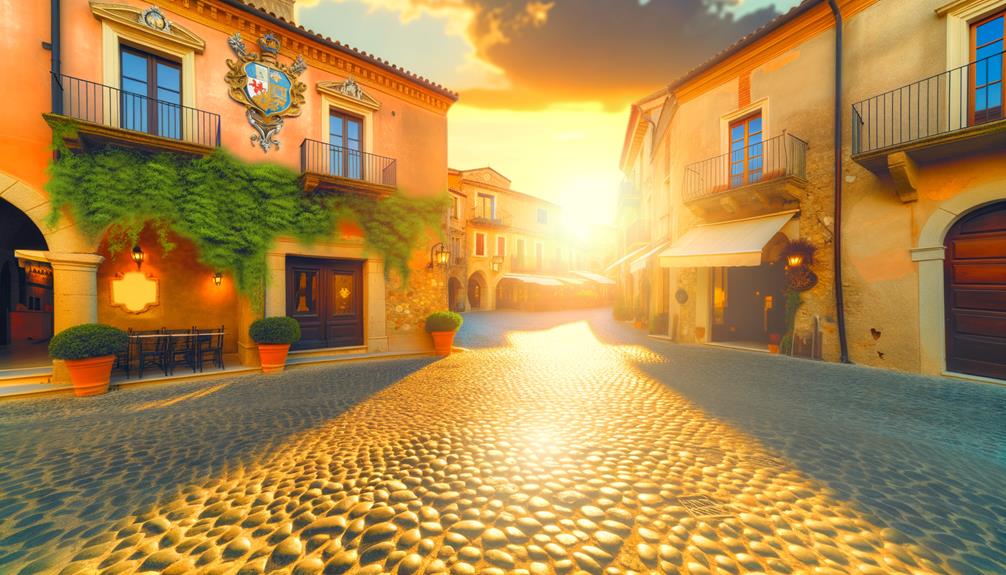Giovanni Name Meaning and Origin
Giovanni, the Italian form of Johannes, derives from the Hebrew name Yochanan meaning 'God is gracious'. The name's evolution from Hebrew to Greek and Latin reflects significant linguistic and cultural intersections.
Emerging in early medieval Italy, Giovanni gained prominence through associations with saints and its prevalence among Italian Christians. Historically notable individuals, such as Renaissance master Giovanni Bellini, have reinforced its cultural significance.
Giovanni remains a poignant name encapsulating centuries of tradition and religious reverence. To uncover the rich tapestry of this name's history and its modern-day resonance, consider exploring further.

Key Takeaways
- Giovanni is the Italian form of the Latin name Johannes, derived from Hebrew Yochanan meaning 'God is gracious'.
- The name's evolution reflects cultural intersections, transforming from Yochanan to Iōannēs in Greek, Johannes in Latin, and Giovanni in Italian.
- Giovanni became popular in medieval Italy, associated with Saint John the Baptist and Saint John the Apostle.
- Historical records and literature show widespread use of Giovanni among Italian Christians during the Middle Ages.
- Influential figures named Giovanni, like Giovanni Bellini and Giovanni Gabrieli, reinforced its prominence in Italian culture and arts.
Etymology of Giovanni
The name Giovanni originates from the Italian form of the Latin name Johannes, which itself is derived from the Hebrew name Yochanan, meaning 'God is gracious.'
This etymological journey underscores a rich tapestry of linguistic evolution, reflecting cultural and historical intersections. The Hebrew root, Yochanan, underwent a transformation as it traversed through different linguistic landscapes, morphing into Iūannēs in Greek and subsequently Johannes in Latin.
The Italian adaptation, Giovanni, emerged during the early medieval period, maintaining the core meaning while adapting phonetically to the Italian vernacular. This transformation highlights the fluid nature of language and its ability to preserve essential meanings across different cultures and epochs, providing an enduring attestation to the name's theological and cultural significance.
Historical Roots
Building on its etymological roots, the historical significance of the name Giovanni is deeply intertwined with the cultural and religious developments of medieval Italy. The name, deriving from the Latin 'Iohannes' and Greek 'Ioannes,' was popularized by its association with Saint John the Baptist and Saint John the Apostle.
During the Middle Ages, Giovanni became a prevalent name among Italian Christians, reflecting the era's strong religious fervor and the influence of the Church. Its widespread use is evidenced in historical records and literature, including the works of Dante Alighieri and Giovanni Boccaccio.
Moreover, Giovanni was often adopted by various influential figures and artists, reinforcing its prominence and enduring legacy in Italian history and culture.
Cultural Significance
Giovanni's cultural significance is profoundly evident in its enduring presence in Italian art, literature, and societal traditions. Historically, the name Giovanni has been borne by many influential figures, including Giovanni Boccaccio, a pivotal writer of the Renaissance, whose works remain central to the Italian literary canon.
In the domain of visual arts, Giovanni Bellini and Giovanni Battista Tiepolo are esteemed painters whose masterpieces profoundly shaped the Renaissance and Baroque periods.
Linguistically, Giovanni is the Italian variant of John, originating from the Hebrew name Yochanan, meaning 'God is gracious.' Its consistent use in religious contexts underscores its deep-seated cultural resonance, reflecting a synthesis of faith and heritage integral to Italian identity.
Popularity Over Time
The name Giovanni has experienced fluctuations in popularity over different historical periods, often influenced by sociopolitical and cultural dynamics. Its prevalence varies markedly across regions, reflecting local naming traditions and historical migrations.
Additionally, the name's popularity has been shaped by notable figures and cultural movements, underscoring its enduring appeal.
Historical Popularity Trends
Throughout history, the name Giovanni has experienced fluctuating levels of popularity, often influenced by cultural and social trends. Originating from Italy, Giovanni saw significant prominence during the Renaissance, a period marked by an emphasis on classical art and humanism. The name's association with notable figures, such as Giovanni Boccaccio and Giovanni Bellini, further cemented its prestige.
In the 20th century, its popularity waned but saw resurgence due to increased interest in Italian culture and heritage. Linguistically, Giovanni's enduring appeal can be attributed to its melodious phonetics and rich historical connotations. Shifts in naming conventions and global migration patterns have also contributed to its varying prominence across different eras and regions.
Regional Popularity Variations
Across various regions, the popularity of the name Giovanni has shown notable fluctuations influenced by cultural, linguistic, and migratory factors. Historically prominent in Italy, Giovanni has experienced varying degrees of acceptance in other parts of the world. For instance, its prevalence in the United States surged during the late 20th century, possibly due to increased Italian-American immigration and cultural integration. In contrast, the name has remained relatively stable in Latin American countries, where it often appears in its Spanish variant, Juan.
| Region | Peak Popularity Period | Current Trend |
|---|---|---|
| Italy | Middle Ages to Present | Consistently Popular |
| United States | Late 20th Century | Moderately Popular |
| Latin America | 19th Century | Stable in Variants |
| Europe (General) | Medieval Era | Declining |
These regional variations underscore the dynamic nature of name popularity across different cultural landscapes.
Influences on Popularity
Examining the influences on Giovanni's popularity over time reveals a complex interplay of historical events, evolving linguistic trends, and shifting cultural preferences. The name Giovanni, rooted in Italian heritage, gained prominence during the Renaissance, a period marked by a resurgence in arts, sciences, and classical learning. Its linguistic appeal lies in its melodious phonetics and strong cultural associations.
Over the centuries, the name's popularity has ebbed and flowed, influenced by notable figures such as Giovanni Boccaccio and Giovanni da Verrazzano. In contemporary times, the global blend of cultures and increased mobility have further diversified its usage, reflecting broader linguistic and cultural trends. Consequently, Giovanni's enduring appeal lies in its rich historical roots and adaptability to changing societal norms.
Famous Giovannis
The name Giovanni has been borne by individuals who have achieved notable acclaim in various fields.
The Renaissance saw the artistic brilliance of Giovanni Bellini, a master painter whose works greatly influenced Venetian art.
In contemporary times, actor Giovanni Ribisi is known for his versatile roles in film and television, while composer Giovanni Gabrieli's contributions to music during the late Renaissance period remain influential.
Renaissance Master Giovanni Bellini
Renowned for his innovative use of color and light, Giovanni Bellini stands as a pivotal figure in the Venetian Renaissance, whose contributions greatly influenced the trajectory of Western art. Born circa 1430, Bellini's mastery of oil painting techniques heralded a new era in art, characterized by rich, translucent colors and atmospheric depth.
His works, such as 'The Feast of the Gods' and 'Madonna and Child,' are celebrated for their serene composition and emotive resonance. Bellini's adoption of perspective and naturalistic detailing advanced the artistic standards of his time, setting the stage for successors like Titian and Giorgione.
Through his profound influence, Bellini cemented his legacy as a cornerstone of Renaissance artistry, advancing both technical prowess and aesthetic sensibility.
Actor Giovanni Ribisi's Roles
Shifting from the artistic legacy of the Renaissance to contemporary cinema, Giovanni Ribisi has carved a niche for himself with a diverse array of memorable roles in film and television. His career, characterized by versatility and depth, has seen him embodying a range of characters, from the quirky to the intense.
| Film/TV Show | Role |
|---|---|
| *Saving Private Ryan* | Medic Irwin Wade |
| *Friends* | Frank Buffay Jr. |
| *Avatar* | Parker Selfridge |
| *Boiler Room* | Seth Davis |
| *Sneaky Pete* | Marius Josipović/Pete |
Ribisi's performances have been lauded for their emotional authenticity, contributing significantly to the narrative fabric of each production. His ability to transform into multifaceted characters underscores his status as a formidable actor in modern cinema.
Composer Giovanni Gabrieli's Influence
Often hailed as a pivotal figure in the shift from Renaissance to Baroque music, Giovanni Gabrieli profoundly influenced the development of polychoral techniques and the Venetian School. His innovative use of spatial separation in St. Mark's Basilica, Venice, allowed for the creation of dynamic, multi-choir compositions that revolutionized ensemble performance.
Gabrieli's work laid foundational principles for future composers, heralding a new era of orchestration and sonic exploration.
To appreciate Gabrieli's influence:
- Polychoral Innovations: Gabrieli's compositions often employed multiple choirs placed in different locations, creating a stereophonic effect.
- Venetian School: His techniques greatly shaped this influential music school, impacting European music.
- Instrumental Music: Gabrieli advanced the role of instrumental ensembles, a precursor to modern orchestration techniques.
Variations and Nicknames
The name Giovanni, derived from the Italian form of John, has numerous variations and nicknames influenced by regional dialects and cultural nuances.
Variations such as Gianni, Gian, and Vanni reflect the linguistic diversity within Italy. Gianni serves as a diminutive, often used affectionately, while Gian is a contracted form frequently paired with other names, such as Gianluca. Vanni, another diminutive, is less common but holds historical significance.
The name also adapts internationally; for instance, in Spanish-speaking regions, it may appear as Juan or Iván. These variations demonstrate the name's adaptability across different cultures and languages, maintaining its essence while embracing regional idiosyncrasies.
Each variant carries its unique historical and cultural connotations, enriching the name's global legacy.
Giovanni in Literature
Building on the rich cultural tapestry of its variations, the name Giovanni has also found significant representation in literature, where it often symbolizes complex characters and intricate narratives. Historical and linguistic analyses reveal its enduring presence in classical and modern texts.
Noteworthy, Giovanni appears in works that explore themes of morality, identity, and existential conflict.
- Giovanni Boccaccio: A seminal figure in Italian literature, Boccaccio's *Decameron* portrays Giovanni as a multifaceted character.
- Giovanni's Room: James Baldwin's profound novel uses the name Giovanni to explore themes of love, identity, and societal norms.
- Don Giovanni: Mozart's opera, based on the legendary libertine, employs the name to explore themes of seduction and retribution.
Such literary representations underscore Giovanni's profound narrative versatility.
Modern Usage
In contemporary contexts, the name Giovanni continues to be emblematic, reflecting both a respect for its historical roots and an ongoing trend in modern naming conventions. The name maintains its popularity, particularly within Italian communities, while also gaining traction globally due to its melodic resonance and classical appeal.
Linguistically, Giovanni embodies a robust phonetic structure, featuring the soft 'G' and the elongated 'a,' which lend it an elegant yet strong presence. Additionally, cultural representations in film, literature, and popular media have further cemented its relevance.
As parents increasingly seek names that balance tradition and modernity, Giovanni serves as a prime example, encapsulating a rich heritage while seamlessly integrating into contemporary settings.
Conclusion
The name Giovanni, deeply rooted in Italian history and culture, epitomizes the enduring appeal of traditional nomenclature. Its etymological origins, traced back to Hebrew and Latin, reveal a rich linguistic tapestry.
Over centuries, Giovanni has maintained its popularity, akin to a timeless masterpiece in an art gallery. Celebrated through literature and borne by notable figures, the name's variations and nicknames further underscore its adaptability and charm in modern usage.
Giovanni remains a symbol of cultural and historical continuity.






